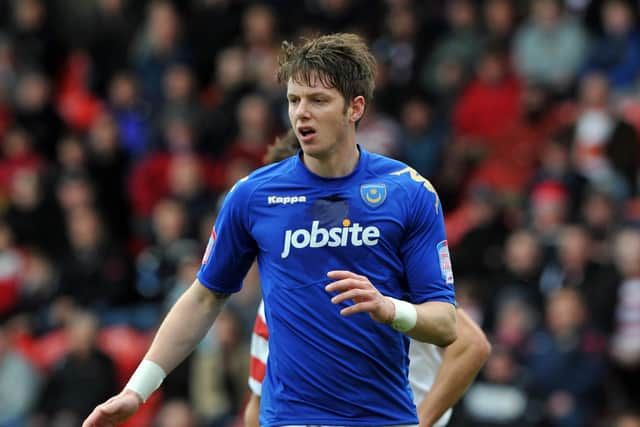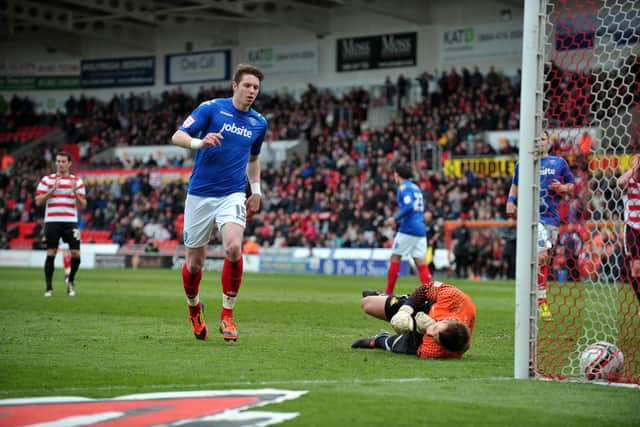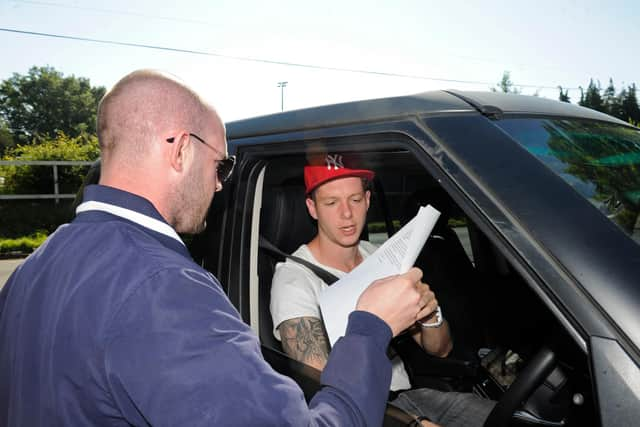Greg Halford: I had been at Portsmouth four days and found out from TV that the club were being liquidated


Pompey would be liquidated within the next week.
It was October 2010, the evening before a Championship clash at Hull – a match now purported to be the last in the history of the two-time winners of the top flight.
According to an official statement distributed by administrator Andrew Andronikou, Pompey would be ‘closed down and liquidated by the Administrators’.


Advertisement
Hide AdAdvertisement
Hide AdGreg Halford, a loanee from Wolves, was in his fourth day with the club, having made his debut in a midweek 1-0 win over Millwall.
Now he found himself embroiled in bitter boardroom brinkmanship threatening the future of a club which had reached the FA Cup final just five months earlier.
He told The News: ‘The manager hadn’t let on anything, which I suppose was a good thing on his part because we were just concentrating on the game.
‘Then, at dinner, Sky Sports News was on and we found out there was the possibility of Pompey being liquidated.


Advertisement
Hide AdAdvertisement
Hide Ad‘After we finished eating, Steve Cotterill held a meeting. The message was “Look, we have travelled all this way. No matter what happens, whether we liquidise and there’s no club, we will still play this game tomorrow”.
‘He insisted we got our heads on the match, which was clever from him. We were encouraged to concentrate on playing football and to focus on winning.
‘I sat there thinking “What the hell is going on?”. I had only played one match – now there was this.
‘It was a difficult period for everyone, yet at least I was still getting paid and had a club to go back to.
Advertisement
Hide AdAdvertisement
Hide Ad‘If it ended up a worst-case scenario, I could return to Wolves, so I was fine. I was all right in the football sense, I could go back and continue as if nothing had happened.
‘For the other players, there were occasions when they hadn’t been paid on time, they had families and mortgages, and now this. I felt for them, of course.
‘Credit to the players, once we stepped over that white line onto the pitch, nothing mattered apart from winning – and that season we won a decent amount of games.
‘We won that game at Hull the following day, I scored in a 2-1 victory after my second-half free-kick took a little deflection.
Advertisement
Hide AdAdvertisement
Hide Ad‘After the season ended, these so-called owners (Convers Sports Initiatives) came in and I joined in a permanent deal, which was definitely what I wanted. Then there were more financial problems.
‘To be honest, it’s a hard thing to put into words quite what happened off the pitch during my two seasons at Fratton Park.
‘I wouldn’t wish it upon anyone in the football world. You look at Bury and feel for them, yet that could have been us, that really could have been us.
‘Luckily it wasn’t –and the people that are always there week in, week out saved the club.’
Advertisement
Hide AdAdvertisement
Hide AdAndronikou’s proclamation had the desired effect, around 24 hours later the Fratton faithful breathed again.
Previous owner Sacha Gaydamak had been outmanoeuvred in the glare of the public eye following a dispute during negotiations to exit administration.
The subsequent change of heart concluded talks to the administrators’ satisfaction, meaning Balram Chainrai was christened owner, in turn selling the club to CSI in June 2011.
Halford had impressed during his 2010-11 season loan, making 33 appearances and scoring five times as Cotterill’s side finished 16th in the Championship.
Advertisement
Hide AdAdvertisement
Hide AdThen, with the new owners providing spending power, the versatile performer was recruited permanently from Wolves for around £1m on a three-year deal.
Little could anyone have realised that within four months there were more financial issues for the crisis hit club – and Halford.
‘I thought I’d played pretty well at Pompey during my loan and returned to Wolves fully committed and focused on doing the right thing for them,’ he added.
‘However, as soon as they signed Roger Johnson from Birmingham that summer, I didn't want to be there any more.
Advertisement
Hide AdAdvertisement
Hide Ad‘I had played centre-back during the majority of my time at Pompey to prove to Mick McCarthy I could perform there – then he recruited Johnson for £4m.
‘For me, what was the point of even trying to fight when he had made his mind up, so I looked at Pompey again. I knew what the club was like, they had new owners and there wasn’t a better place to go.
‘Then we went into administration again.
‘I remember that event for all the wrong reasons because I had a quad bike delivered on the very same day.
‘I had ordered it weeks before, but it just so happened it turned up at the training ground on the back of a trailer on the day we went into administration, which didn’t look good at all.
Advertisement
Hide AdAdvertisement
Hide Ad‘There were people being made redundant and it looked so bad, there was no getting away from it.
‘I was staying at the Marriott for most of my time at Pompey, so had nowhere to store it, so kept it in one of the big lock up containers.
‘When people were being made redundant at the training ground, everything went missing, such as tractors – and my quad bike. The container had a pin code and had been opened, the locks weren’t broken.
‘My bike wasn’t even insured, I had driven it around the training ground once.
Advertisement
Hide AdAdvertisement
Hide Ad‘So I put out a Tweet, offering a reward, but it wasn’t great timing. I made a lot of mistakes on social media and that was one of them. Although I never got the quad bike back.’
With Michael Appleton forced to clear out his senior players in the summer of 2012 to reduce the wage bill of a club still in administration, Halford departed.
He secured a cut-price move to Nottingham Forest in July 2012 – on the same day David Norris joined Leeds.
After 77 appearances and 12 goals, Halford, who played central midfield in the famous St Mary’s 2-2 draw that season, left.
Advertisement
Hide AdAdvertisement
Hide AdHe said: ‘How it ended was frustrating. For me and the rest of the players, it felt like the administrator was not doing his utmost for the club.
‘He didn’t care whether or not Pompey was saved because he and his company would still be paid.
‘Yes it was a difficult time, but the positive was the fans getting what they wanted – a club treated how it should be treated.
‘I don’t know what other players owed money did, but I took a lump sum at a cut rate rather than spread over time.
Advertisement
Hide AdAdvertisement
Hide Ad‘I wouldn’t hold the club to ransom, they stuck by me, and I felt I had to repay them in some way which wasn’t on the field. That was the best way I could.
‘I so wanted to stay. That summer Pompey were cutting the wage bill and Appy told me I couldn’t go on tour with them to Spain and Gibraltar.
‘I was told: “We just can’t afford to be able to keep you”. That was it. It was a sad end.
‘Some of the best football of my career was played at Pompey. It was a happy time because of the way I was treated, mainly by the fans, and I had a good rapport with them.
‘When you have a good relationship with the supporters, how can you not enjoy yourself? I will be forever grateful how they treated me and hopefully I repaid them a little on the pitch.’
Comment Guidelines
National World encourages reader discussion on our stories. User feedback, insights and back-and-forth exchanges add a rich layer of context to reporting. Please review our Community Guidelines before commenting.
